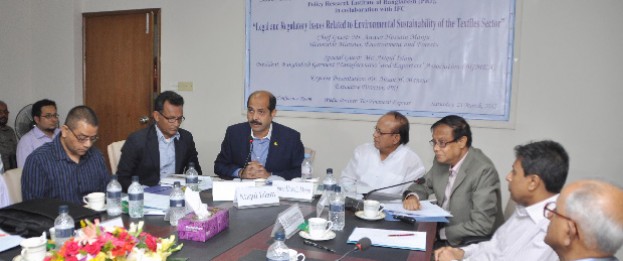


March 22, 2015
Experts forframing rules to make textile industry green
In the wake of increasing demand for green products globally, experts suggested framing rules for making the textile industry environmental complaint for enhancing its competitiveness and sustainability.
They also made a set of recommendations, including giving financial or fiscal incentives to encourage entrepreneurs to low-cost cleaner production practices and making aware that the reduction of energy consumption can be a real cost-cutter.
The recommendations were made at a seminar on “Legal and Regulatory Issues Related to Environmental Sustainability of the Textiles Sector,” organised jointly by Policy Research Institute (PRI) and International Finance Corporation (IFC) at the PRI conference room on March 21.
Speaking at the function, Environment and Forest Minister Anwar Hossain Manju said his ministry had put its best efforts to improve environment in the country.
“There are lots of regulations but effective implementation of them is important to reduce pollution,” he said.
BGMEA President Md. Atiqul Islam said ensuring quality and environmental matters in the factories is increasingly becoming a global issue.
“This means if any of the two is missing, you are simply out of business.”
“But it is easy for big factories but not for small factories to address the environmental pollution, which is a challenge.”
He laid emphasis on financial support at lower interest for implementing the environmental issue.
Senior environmental adviser to GIZ in Bangladesh TanujaBhattacharjee said rules and proper guidelines are necessary to make textile industry competitive as environmental sustainability is becoming an increasingly important issue in international arena.
“It is high time to look at the issue so that we can set example before the world,” she said.
She said GIZ is going to launch mobile testing water wastage programme by June next to identify the level of environment pollution in the textile industry.
Assistant Chief of Ministry of Environment and Forest, Khalid Hassan said the ministry is in the process of enacting Land Zoning Act to help make cluster textile industry outside of the city.
Chief Operating Officer of Comfit Composite Limited, MdKawser Ali described that how his company had reduced use of water by adopting environment-friendly technology.
“Use of water has fallen to 50 litres from 180 litres for cleaning per kilogram fabric.”
PRI Executive Director Ahsan H Mansur emphasised the need to address the environmental issue before being late for keeping the environment clean for generations to come.

Copyright © 2020, The Bangladesh Garment Manufacturers and Exporters Association.
Version-2.0, Design & Developed by Systech Digital Limited.
Version-2.0, Design & Developed by Systech Digital Limited.



